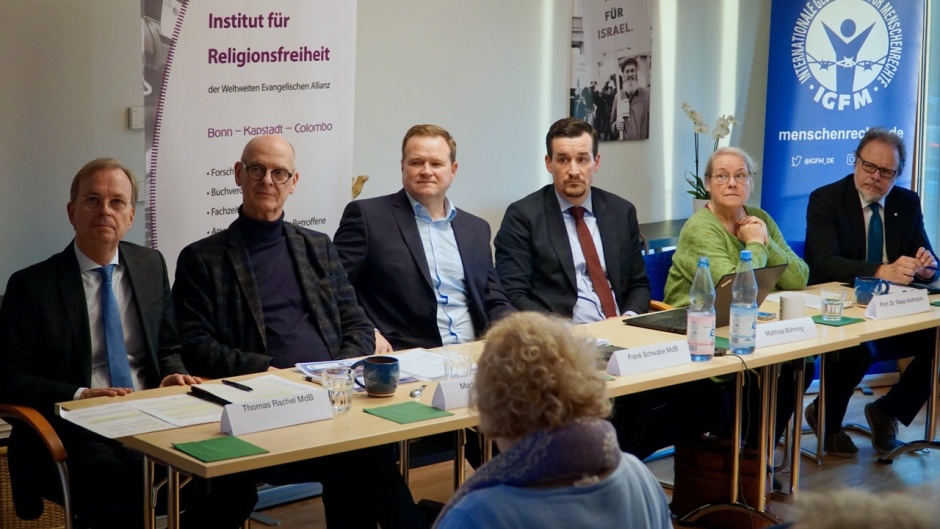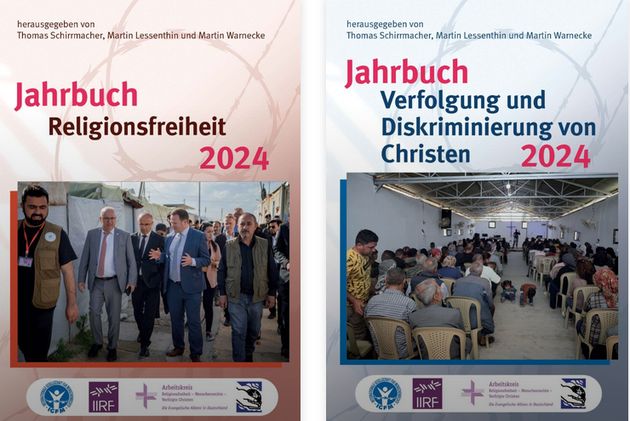“There can be no world peace without religious peace”
The German-speaking evangelical alliances, the IIRF and the ISHR, launch yearbooks on religious freedom and persecution against Christians.
WEA · BONN · 12 DECEMBER 2024 · 18:45 CET

The International Society for Human Rights (ISHR), along with the German, Swiss and Austrian Evangelical Alliances and the International Institute for Religious Freedom (IIRF), recently launched the Yearbook on Persecution and Discrimination of Christians 2024 (‘Jahrbuch Verfolgung und Diskriminierung von Christen 2024’) and the Yearbook on Religious Freedom 2024 (‘Jahrbuch Religionsfreiheit 2024’).
“There is practically no socially relevant issue that does not play a role in religious freedom. In hardly any region of the world has the situation regarding religious freedom and human rights improved compared to ten years ago. Unfortunately, the opposite is the case”, pointed out the president of ISHR, Thomas Schirrmacher.
“Particularly concerned” about Europe
Authors are “particularly concerned” about the situation in the Middle East and its impact on Europe, specially in Turkey and Germany.
Frank Heinrich, head of the German Evangelical Alliance, warned about the misuse of religion for political and geostrategic goals.
“An example of the reverse instrumentalisation of religion can be found in Turkish President Erdogan’s long-standing and ever-increasing anti-Jewish and anti-Israeli hatred”, he said.
For Heinrich, “this is not a new phenomenon; his attitude was already evident in 2010 in connection with the Gaza flotilla that left Istanbul for Gaza. Today more than ever, however, his hostile and hateful attitudes seem to be paying off in terms of domestic politics”.
He also expressed his concern for “the growing number of hate crimes against Christians in Europe”.
Felix Böllmann, director of European advocacy at ADF International, agreed that “in Europe, so-called ‘hate speech’ laws are increasingly leading to restrictions on the expression of faith”.
“Their deterrent effect favours self-censorship and silences people, with serious consequences for the social climate, religious communities and personal beliefs”, added Böllmann.

Russia, India and China
In addition to the situation in the Middle East, Turkey and Germany, the yearbooks also pay attention to “hotspots” such as Russia, Africa, India and China.
“China’s role in the repression of believers, blasphemy laws in India and Islamic states as well as anti-conversion laws have become major threats to the human right to religious self-determination”, says the IIRF.
“Dictators learn from other dictators. They are afraid of religious freedom and human rights and are updating their methods to intimidate critics or cover up human rights violations”, underlined Martin Lessenthin, human rights expert and co-editor of the yearbooks.
Volker Kauder, chairman of the CDU/CSU group in the German parliament, denounced that “by advocating this war, the Russian Orthodox Church is undermining Christian morality. Defining a belief as correct leads to great pressure of persecution, especially for Christians, particularly in Islamic states”.
“No world peace without religious peace”
According to the federal chairman of the Protestant working group of the CDU German party, Thomas Rachel, “in times of numerous violent conflicts, it is clear that there can be no world peace without religious peace”.
“What concerns me deeply is that, on a global scale, Christians in particular are affected by defamation, discrimination and persecution. We must treat religious beliefs with respect and consideration”, he added.
One more year
Learn all about our #OneMoreYearEF campaign here (English).
Published in: Evangelical Focus - life & tech - “There can be no world peace without religious peace”
